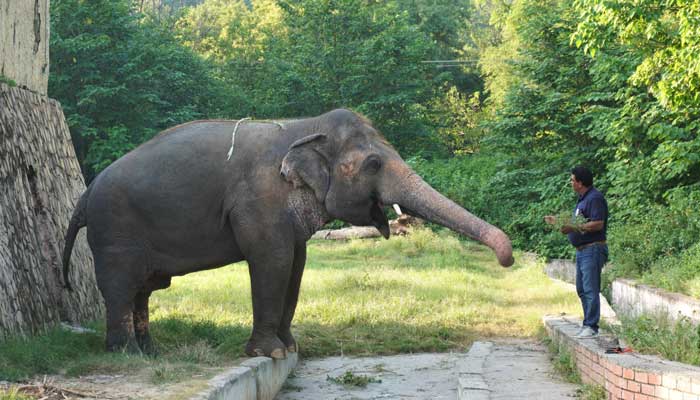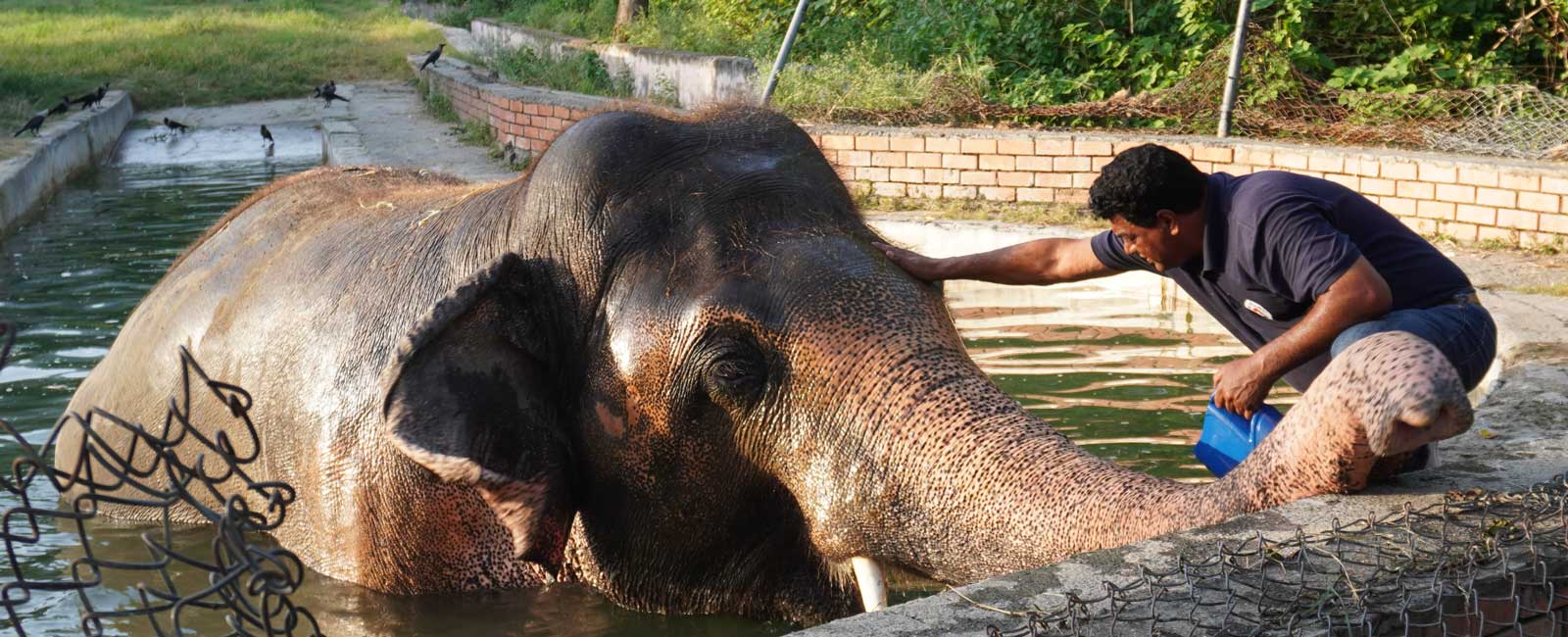Does freedom await Kaavan, ‘The world’s loneliest elephant?’
Kaavan is being rehabilitated by a team of international experts before his journey to a sanctuary in Cambodia

On a weekday, the vicinity outside the Islamabad Zoo (once known as Marghazar Zoo) is crowded with families and their children milling about, buying toys, snacks and drinks from the kiosks set-up near the entrance.
However, the zoo’s bright yellow main gate is closed and every now and then, hopeful visitors walk up to the gate to peek in, straining their necks to catch sight of a security guard to let them in.
Making my way to the zoo’s second, unofficial gate, I walk down a winding little path to the elephant enclosure. The zoo is peaceful and still. There is a heaviness in the air, perhaps it is because I’m thinking about the two lions and the horrors they endured when they were terrorised with fire as a means to remove them from their enclosures and into cages (in a bid to shift them to a sanctuary in Lahore).
The pair — a male and female — were injured, traumatised, and eventually suffocated to death at the hands of inexperienced caretakers last month.
But perhaps I’m also feeling terribly wretched because I’m thinking of Kaavan. I’m going to finally see him with my own eyes, after following his distressing story for a few years.
It’s a strange full-circle moment and I feel I’m in a dream.
In 2017, I interviewed a renowned veterinarian, Amir Khalil, of the international animal welfare organisation, Four Paws International. I had reached out to Amir through a foreign correspondent after watching a documentary on Amir and his team’s incredible rescue of the last remaining animals at Magic World, a zoo in Aleppo, Syria, which had been caught in the crossfire of the war.
And here I was, today, on my way to meet Amir — a man who has dedicated his life to rescuing neglected animals from war zones and setting up animal sanctuaries around the world.
Arriving at Kaavan’s enclosure, a miserable space where he has been kept chained and in confinement for years, I see Amir and Kaavan in the distance, framed by a backdrop of the Margalla Hills. Having spent the past four weeks training and caring for Kaavan, one can see how closely bonded they are. It’s heartwarming watching Kaavan look so at ease, so loved, so seen.
It’s a far cry from the videos which went viral a few years ago which depicted Kaavan swaying his head from side to side, a sign of extreme distress.
But now, Kaavan finally has a chance to live a life he has always deserved: at a sanctuary in Cambodia amidst other elephants like himself.
After immense local and foreign pressure by way of animal rights activists and international media attention, the government of Pakistan has agreed to release Kaavan. But before the journey, Kaavan has to be trained — the years of neglect and abuse has damaged him on an emotional and psychological level. This is where animal whisperer Amir comes in.
“When we first arrived, Kaavan was mentally very disturbed,” states Marion Lombard, who has accompanied Amir to Islamabad on their month-long mission for Kaavan.
Working at Four Paws’ project development and rapid response unit, Marion states that when she landed in the capital (late last month), she saw an elephant that needed immediate care.

“He was moving from left to right all the time and was showing some signs of aggression,” she says, as we stand at a distance from Kaavan’s enclosure. “He really needed attention, there has been no one here to take care of him properly. But he has changed so much in the past 3-4 weeks. I don’t recognise Kaavan to be honest. He wouldn’t allow anyone to touch him but then Amir arrived. Now Amir can touch him and pet him…this is something that has never happened before.”
Having worked closely with Amir for several years, Marion reveals that Amir would always tell her that in this line of work one should never get attached to the animals because it can prove to be quite heartbreaking. However, this is the first time that she’s seen Amir allow himself to become so bonded with an animal. “It’s very touching,” she says, slightly choked up herself.
At the zoo, Amir feeds Kaavan sugar cane and gently coaxes him into the water pond for a bath. Throughout, Frank Sinatra’s ‘My Way’ blares from Amir’s cellphone. Amir sings and hums to Kaavan. The external world has blurred out. Here, in the present, all that exists is Kaavan and Amir. And Frank Sinatra.
Watching them interact feels otherworldly, this is not just a run-of-the-mill wild animal training routine, this is a spiritual practice in motion — a trust, a connection that surpasses all logic.
“Kaavan has survived for thirty-five years over here. He’s a fighter,” Amir says, during a quick break after bathing Kaavan. “I first saw Kaavan in 2016 during my visit to the zoo. After four years, I feel his condition has worsened.”
But Amir is hopeful about Kaavan’s progress. There’s still a lot that has to be done. For one, and most importantly, getting his diet and health back on track, apart from training Kaavan to undertake a safe journey from Pakistan to Cambodia.
Then there’s the mammoth task of building a container for Kaavan and mapping out the logistics — will Kaavan travel by plane or by road? What would be safest?
It’s going to be quite a feat, however, given Amir’s past rescues dodging bombs and crossing risky borders, the Kaavan mission will be successful, provided the Pakistani government shoulders and supports the beloved elephant’s journey to freedom.
“I don’t know what has come over me,” Amir says softly, “This is the first time I’ve felt something like this. I was supposed to leave a week ago, but I delayed my flight after I saw Kaavan waiting at the same spot where I fed him. I felt he was standing and waiting for me.”
Walking back to the pond, Amir begins singing to Kaavan as the elephant reaches out to take a piece of sugar cane with his trunk from a zoo attendant. Kaavan’s eyes are closed as he stands partially submerged in the water.
Amir strokes his head, an apple in his hand, then leans over and rests his face on Kaavan’s head, still singing.
It is almost sundown.
Rehman is a journalist based in Lahore.




